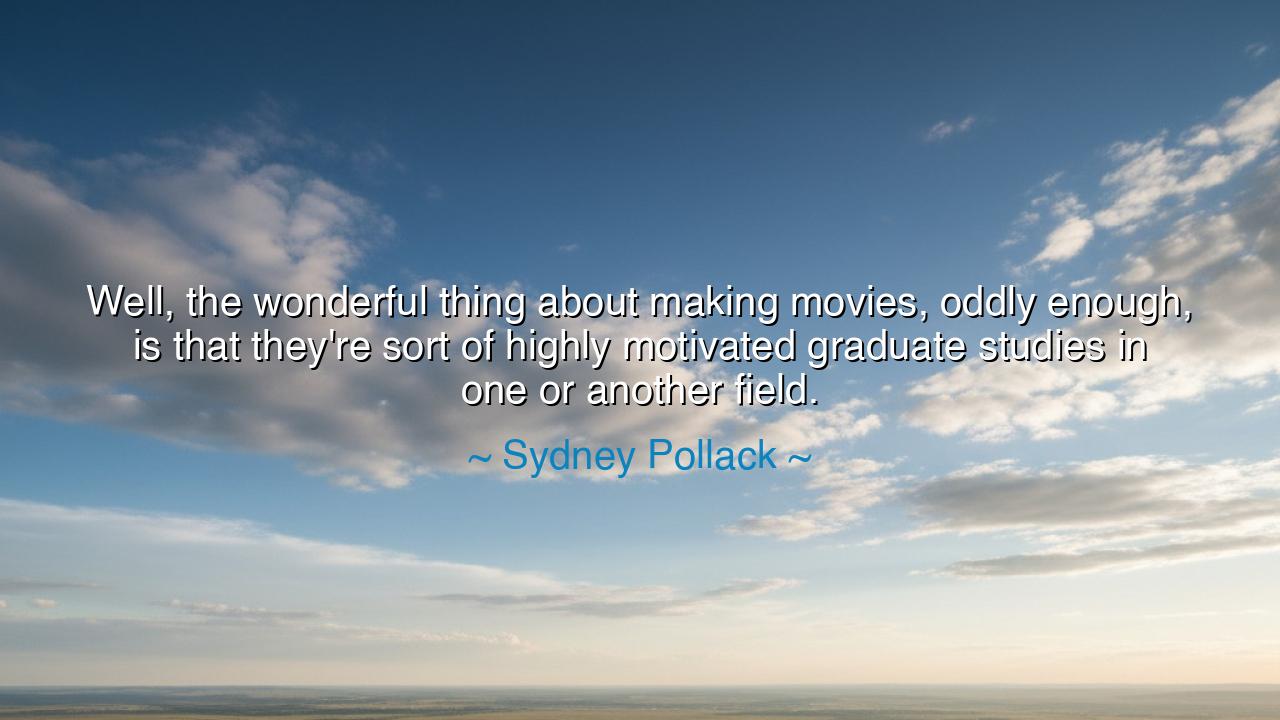
Well, the wonderful thing about making movies, oddly enough, is
Well, the wonderful thing about making movies, oddly enough, is that they're sort of highly motivated graduate studies in one or another field.






Hear the words of Sydney Pollack, master storyteller and seeker of truth through art: “Well, the wonderful thing about making movies, oddly enough, is that they're sort of highly motivated graduate studies in one or another field.” At first this may sound simple, yet in it lies a profound vision of the artist’s journey. For every film is more than spectacle—it is an education, a plunge into the mysteries of life, culture, and the human condition. The director does not merely stage a story, he becomes a scholar of worlds unknown, compelled to learn deeply so that what unfolds on the screen bears the weight of authenticity.
In Pollack’s words, we are reminded that to create is to study, to learn, and to inhabit the lives of others. Each film demands immersion: if it is a tale of politics, the filmmaker must study the machinery of power; if it is a story of war, he must grasp the strategies, the sorrows, the courage of the battlefield; if it is love, he must understand the fragile alchemy of the heart. Thus, a director is forever a student, not of books alone, but of life itself. And the work becomes, as Pollack said, a form of “graduate study,” where knowledge is pursued not for a degree, but for truth.
Consider Pollack’s own creation, Out of Africa. To craft that tale, he was compelled to delve into the history, geography, and spirit of Kenya. He studied not merely the landscape, but the lives of farmers, colonists, and tribes. Through this, he did not only make a film—he expanded his own vision of the world. In this way, cinema is both mirror and classroom: the director teaches the audience, but only after he himself has been taught. The wisdom of Pollack’s quote lies here—that filmmaking, at its best, is a quest for knowledge disguised as art.
This truth is not confined to cinema alone. Think of Leonardo da Vinci, who, in pursuit of art, studied anatomy, flight, engineering, and water. His paintings were not born of imagination alone, but of rigorous learning. In him, as in Pollack, we see that the path of creation and the path of study are inseparable. To create authentically, one must first understand. Every great artist, every innovator, has been also a student of many disciplines, driven by necessity and by wonder.
The wisdom here is deeply motivational: that one must never cease to learn. Each endeavor, whether it be a film, a book, or even a conversation, is an invitation to broaden one’s understanding. Just as the filmmaker becomes a temporary expert in the world he seeks to portray, so must we, in our own lives, treat every challenge as a study. To lead is to study people; to heal is to study suffering; to love is to study the heart of another. Life itself is a series of graduate studies, if only we approach it with humility and hunger for truth.
The lesson for us is clear: when faced with new work, new relationships, or new trials, let us not shrink from the effort to learn. Approach each as the director does his film—with curiosity, with discipline, with the joy of discovery. Read, listen, observe, immerse yourself. Let your tasks become not mere obligations, but studies that deepen your soul. For in such practice, even ordinary life becomes extraordinary.
So, my children of the future, let this teaching endure: see every moment of your journey as a film you are making, and every challenge as a field of study. Walk into new realms as Pollack did—with open eyes, eager heart, and unwearied mind. For to live in such a way is to transform life into both education and art, where each day teaches you more, and each act leaves behind a story worthy of remembrance.






AAdministratorAdministrator
Welcome, honored guests. Please leave a comment, we will respond soon